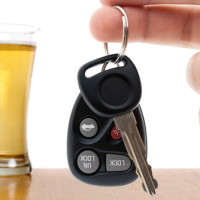What to Expect when You’re Pulled Over for a DUI in Virginia

Driving drunk is never a safe practice, and with the proliferation of ride sharing applications, there’s no excuse to get behind the wheel after you’ve had too much to drink. However, as an American citizen, you’re protected by certain constitutional rights when suspected of or charged with a crime, and you should know those rights when you’re confronted by a police officer who believes you may be driving under the influence of alcohol or drugs. Read on to learn what to expect if you’re pulled over by a Virginia police officer for a DUI, and to understand your rights under Virginia law.
- Remain as calm as possible
When you see the flashing lights of a police officer in your rear view mirror, remain as calm as possible, and find the nearest safe place to pull over. The police officer has already begun to watch how you move and act for further evidence that you’re intoxicated. Stay as still as possible without making suspicious or sudden movements, and take deep breaths to calm yourself while the officer prepares to approach your vehicle. Should you be placed under arrest for a DUI, the police officer will cite behavior such as fumbling your wallet when pulling out your license, or being flushed and fumbling your words as potential evidence of intoxication. - Be respectful without saying too much
Most of us will go out of our way to cooperate with police officers, in order to remain on their good side. And while you’d be putting yourself at risk for further legal penalties if you’re sarcastic or combative with the police officer, you are not required to answer questions other than providing basic identifying information. The officer will use subjective opinions on whether or not your speech is “slurred” or “slow” as evidence of your intoxication, so any speaking you do could support such a claim, and answers to questions such as, “Have you been drinking,” or “what were you doing this evening” could be incriminating, whether or not you’re driving while above the legal blood alcohol limit. - Without other evidence of intoxication, refusing to take a field breath or other sobriety test cannot result in your arrest or loss of your driver’s license
If the police officer continues to suspect you of being intoxicated, he or she may ask you to step out of the car and complete field sobriety tests. You may not refuse direct orders from the officer, such as an order to step out of your vehicle. However, you may state that you do not consent to blowing into a handheld “alco-sensor” or to complete any field sobriety tests, and the officer will not be permitted to use that refusal as evidence of your intoxication. The officer may not arrest you without sufficient evidence of your intoxication. Should you submit to the tests, you may provide that evidence, but if you decline (politely), the officer will have to find and rely on other evidence to press charges. - Should you be arrested, your possession of a Virginia driver’s license implies that you have consented to taking a breath or blood test of your blood alcohol level
While refusing to take a field sobriety test or blow into a portable preliminary alcohol screen will not necessarily result in a penalty prior to arrest, things change once you’ve been placed under arrest. Under Virginia’s “implied consent” law, once you’re arrested, if you refuse a chemical test, your license will automatically be suspended—a suspension which could last as long as a year for your first refusal, and up to three years for any subsequent refusals. - Contact an attorney as soon as possible after a license suspension or arrest for a DUI
DUI defense is a very technical area of the law. If you’ve been arrested in Virginia for a DUI, or have had your license suspended for refusal to submit to a test, contact an attorney as soon as possible who will understand what steps to take to help you avoid a conviction or reduce the suspension. For a free consultation on your DUI, contact a dedicated Glen Allen criminal defense attorney at Farmer Legal, PLLC, at (804) 325-1441.


